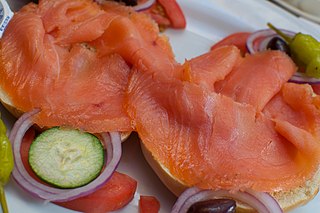Salting or Salted may refer to:

In woodworking, hewing is the process of converting a log from its rounded natural form into lumber (timber) with more or less flat surfaces using primarily an axe. It is an ancient method, and before the advent the sawmills, it was a standard way of squaring up wooden beams for timber framing. Today it is still used occasionally for that purpose by anyone who has logs, needs beams, and cannot or would prefer not to pay for finished lumber. Thus, homesteaders on frugal budgets, for example, may hew their own lumber rather than buy it.
A groom is a male participant in a wedding ceremony.
Salty commonly refers to:
Hound dog or Hound Dog may refer to:
"Anorak" is a British slang term which refers to a person who has a very strong interest, perhaps obsessive, in niche subjects. This interest may be unacknowledged or not understood by the general public. The term is sometimes used synonymously with "geek" or "nerd", or the Japanese term "otaku", albeit referring to different niches.

Lox is a fillet of brined salmon, which may be smoked. Lox is frequently served on a bagel with cream cheese, and often garnished with tomato, onion, cucumber, and capers.
Poochie or Poochy may refer to:

A saveloy is a type of highly seasoned sausage, usually bright red, normally boiled and available in fish and chip shops around Britain. It is sometimes also available fried in batter.
Slaný or Slany is a Czech and Slovak surname. It is derived from the Czech–Slovak word slaný for "salty." It may be a metonymic occupational name for a producer or seller of salt. Notable people with the name include:
A dogsbody, dog's body, or less commonly dog robber is someone who does menial or drudge work. Originally, in the British Royal Navy, a dogsbody was a semi-sarcastic colloquialism for a junior officer or midshipman. A batman has a similar function.

Various unique terms are used in bartending.

A dog ear is a folded down corner of a book page. The name refers to the ears of many breeds of domestic dog flapping over. A dog ear can serve as a bookmark. Dog-earing is also commonly used to mark a section or phrase in a book that one finds to be important or of personal meaning. Other names for this practice include page folding and corner turning. The practice is generally frowned upon by those that want to preserve books in their original condition. It is also sometimes used to keep sheets of paper together, in the absence of a stapler or paper clip.
Trademark distinctiveness is an important concept in the law governing trademarks and service marks. A trademark may be eligible for registration, or registrable, if it performs the essential trademark function, and has distinctive character. Registrability can be understood as a continuum, with "inherently distinctive" marks at one end, "generic" and "descriptive" marks with no distinctive character at the other end, and "suggestive" and "arbitrary" marks lying between these two points. "Descriptive" marks must acquire distinctiveness through secondary meaning—consumers have come to recognize the mark as a source indicator—to be protectable. "Generic" terms are used to refer to the product or service itself and cannot be used as trademarks.
Bing most often refers to:

Noon chai, also called Kashmiri tea, pink tea, gulabi chai, Namkeen chai, and Sheer chai is a traditional tea beverage originating in Kashmir. It is made with gunpowder tea, milk and baking soda. It has become popular in Pakistan, India and the Caribbean.

Cabbeling is when two separate water parcels mix to form a third which sinks below both parents. The combined water parcel is denser than the original two water parcels.
Boredom, tedium, ennui, is an emotional or psychological state of mind.






